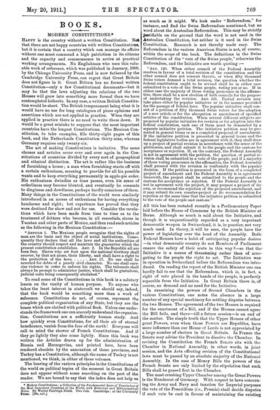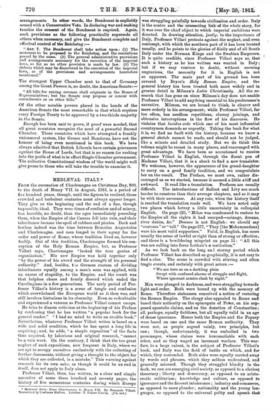BOOKS,
MODERN CONSTITUTIONS.*
HAPPY is the country without a written Constitution. Net that there are not happy countries with written Constitutions,
but it is certain that a country which can manage its affairs without one must command a high patriotism in its citizens and the capacity and commonsense to arrive at practical working arrangements. No Englishman who uses this valu- able work of reference, which was published in January, 1909, by the Chicago University Press, and is now fathered by the Cambridge University Press, can regret that Great Britain does not figure in it. Great Britain has no formal written Constitution—only a few Constitutional documents—but it may be that the laws adjusting the relations of the two Houses will grow into something more formal than we have contemplated hitherto. In any case, a written British Constitu- tion would be short. The British temperament being what it is would have no use for long catalogues of pious opinions and assertions which are not applied in practice. When they are applied in practice there is no need to write them down. It would be a great mistake to suppose that the most important countries have the longest Constitutions. The Mexican Con- stitution, to take examples, fills thirty-eight pages of this book, and the Netherlands Constitution thirty-nine, whereas Germany requires only twenty-six.
The art of making Constitutions is imitative. The same clauses and articles occur over and over again in the Con- stitutions of countries divided by every sort of geographical and ethnical distinction. The art is rather like the business
of furnishing a house ; a man when furnishing starts off with a certain enthusiasm, meaning to provide for all his possible wants and to keep everything permanently in apple-pie order.
His enthusiasm dwindles as time passes, even his sense of orderliness may become blunted, and eventually he consents to dinginess and dowdiness, perhaps hardly conscious of them. Many things in the Constitutions of the world were similarly introduced in an access of enthusiasm for having everything handsome and right ; but experience has proved that they were destined for show and not for use. Consider the revela- tions which have been made from time to time as to the treatment of debtors who become, in all essentials, slaves in Yucatan and other parts of Mexico, and then read such articles as the following in the Mexican Constitution
"ARTICLE 1. The Mexican people recognize that the rights of man are the basis and the object of social institutions. Conse- quently they declare that all the laws and all the authorities of the country should respect and maintain the guaranties which the present constitution establishes. ART. 2. In the Republic all are born free. Slaves who set foot upon the national territory shall recover, by that act alone, their liberty, and shall have a right to the protection of the laws ART. 17. No one shall be arrested for debts of a purely civil character. No one shall exer- cise violence in order to enforce his rights. The tribunals shall always be prompt to administer justice, which shall be gratuitous, judicial costs being consequently abolished."
To read some of the Constitutions in this book is a salutary lesson on the vanity of human purpose. To anyone who takes the least interest in statecraft we should say, indeed, that the book would be- something more than a work of
reference. Constitutions do not, of course, represent the complete political organization of any State, but they are the
bones which are clothed with political flesh. Unless one under- stands the framework one can scarcely understand the organiza- tion. Constitutions are a sufficiently human study. And how quickly even Constitutions, for all their air of eternal beneficence, vanish from the face of the earth ! Everyone will call to mind the shower of French Constitutions. And if they go lightly they also come lightly. Since this book was written the Articles drawn up for the administration of Bosnia and Herzegovina, and printed here, have been rendered obsolete by the annexation of those provinces, and Turkey has a Constitution, although the name of Turkey is not mentioned, we think, in either of these volumes.
The bearing of the various principles in the Constitutions of the world on political topics of the moment in Great Britain does not appear without some searching on the part of the reader. We are bound to say that the index does not help us
• Modern Constitutions; a Collection of the Fundamental Laws of Twenty-tiro of the Most Important Countries of the World, with Historical and Bibliographical Notes. By Walter Fairleigh Dodd. Two vols. Cambridge : at the University Press. [20s. net.) as much as it might. We look under " Referendum," for
instance, and find the Swiss Referendum mentioned, but no word about the Australian Referendum. This may be strictly justifiable on the ground that the word is not used in the Australian Constitution, but neither is it used in the Swiss Constitution. Research- is not thereby made easy. The Referendum in the various American States is not, of course, within the scope of the book. The definitions in the Swiss Constitution of the " vote of the Swiss people," otherwise the Referendum, and the Initiative are worth quoting
"ART. 120. When either council of the Federal Assembly resolves in favour of a total revision of the constitution and the other council does not consent thereto, or when fifty thousand Swiss voters demand a total revision, the question whether the federal constitution ought to be revised shall be in either case submitted to a vote of the Swiss people, voting yes or no. If in either case the majority of those voting pronounce in the affirma- tive, there shall be a new election of both councils for the purpose of undertaking the revision. ART. 121. Partial revision may take place either by popular initiative or in the manner provided for the passage of federal laws. The popular initiative shall con- sist of a petition of fifty thousand Swiss voters for the adoption of a new article or for the abrogation or amendment of specified articles of the constitution. When several different subjects are proposed by popular initiative for revision or for adoption into the federal constitution, each one of them must be demanded by a separate initiative petition. The initiative petition may be pre- sented in general terms or as a completed proposal of amendment. If the initiative petition is presented in general terms and the federal legislative bodies are in agreement with it, they shall draw up a project of partial revision in accordance with the sense of the petitioners, and shall submit it to the people and the cantons for acceptance or rejection. If, on the contrary, the Federal Assembly is not in agreement with the petition, the question of partial re- vision shall be submitted to a vote of the people, and if a majority, of those voting pronounce in the affirmative, the Federal Assembly shall proceed with the revision in conformity with the populau decision. If the petition is presented in the form of a completed- project of amendment and the Federal Assembly is in agreement therewith, the project shall be submitted to the people and the cantons for acceptance or rejection. If the Federal Assembly is not in agreement with the project, it may prepare a project of its• • own, or recommend the rejection of the proposed amendment, and it may submit its own counter-project or its recommendation for rejection at the same time that the initiative petition is submitted' to the vote of the people and cantons."
All this has been restated recently in a Parliamentary Paper laid before the House of Commons by the British Minister at •
Berne. Although so much is said about the Initiative, and though it is unquestionably regarded as a very important democratic weapon in Switzerland, it is, in practice, not very much used. In theory, it will be seen, the people have the power of legislating over the head of the Assembly. Both' Federal Houses have a habit of anticipating popular desires —in what democratic country do not Members of Parliament ensure the safety of their seats in this way P—so that the-
Initiative is a means of threatening rather than of arro- gating to the people the right to act. The Initiative was
in operation in Switzerland before the Referendum was intro- duced. On reading the report of the British Minister one can hardly fail to see that the Referendum, which is, in fact, a right of veto placed in the bands of the people, is perfectly separable from the Initiative. In Great Britain there is, of course, no demand and no need for the Initiative.
In examining the powers of Second Chambers in the various Constitutions, one notes the absence in a large number of any special machinery for settling disputes between the two Houses. The agreement of the two Houses is required for the enactment of a Bill, and if the Houses cannot agree the Bill fails, and there—till a future session—is an end of the matter. The simple truth that the Upper Houses of other great Powers, even when those Powers are Republics, have more influence than our House of Lords is not appreciated by a large number of electors in Great Britain. In France the Senate may advise the President to dissolve the Chamber. In revising the Constitution the French Senate sits with the Chamber in National Assembly, in other words, in joint session, and the Acts effecting revision of the Constitutional laws must be passed by an absolute majority of the National Assembly. In the case of Money Bills the powers of the
French Senate are only limited by the stipulation that such Bills shall be passed first in the Chamber.
The most crushing Upper Chamber among the Great Powers is the Bundesrat of Germany. With respect to laws concern- ing the Army and Navy and taxation for Imperial purposes the vote of the Praesidium (i.e., Prussia) shall decide disputes if such vote be cast in favour of maintaining the existing
arrangements. In other words, the Bundesrat is explicitly tanned with a Conservative Veto. In declaring war and making treaties the consent of the Bundesrat is required. Again, such provisions as the following practically supersede all others when necessary, and give the Bundesrat oomplete and effectual control of the Reichstag :— " Aar. '7. The Bundesrat shall take action upon : (1) The Pleasures to be propeeed to the Reichstag, and the resolutions passed by the same. (2) The general administrative provisions and arrangements necessary for the execution of the imperial laws, so far as no other provision is made by law. (3) The defects which may he discovered in the execution of the imperial laws, or of the provisions and arrangements heretofore mentioned."
The strongest Upper Chamber next to that of Germany among the Great. Powers is, no doubt, the American Senate :—
" All bills for raising revenue shall originate in the House of Representatives; but the Senate may propose or concur with Amendments as on other bills."
Of the other notable powers placed in the hands of the American Senate the most remarkable is that which requires .every Foreign Treaty to be approved by a two-thirds majority in the Senate.
Enough has been said to prove, if proof were needed, that All great countries recognize the need- of a powerful Second Chamber. Those countries which have attempted a frankly unicameral system, like Greece and Honduras, have not the honour of being even mentioned in this book. We have always admitted that British Liberals have certain grievances against the House of Lords, but that is no reason for rushing into the perils of what is in effect Single-Chamber government. The collective Constitutional wisdom of 'the world might well give pause to those who will take the trouble to examine it.









































 Previous page
Previous page